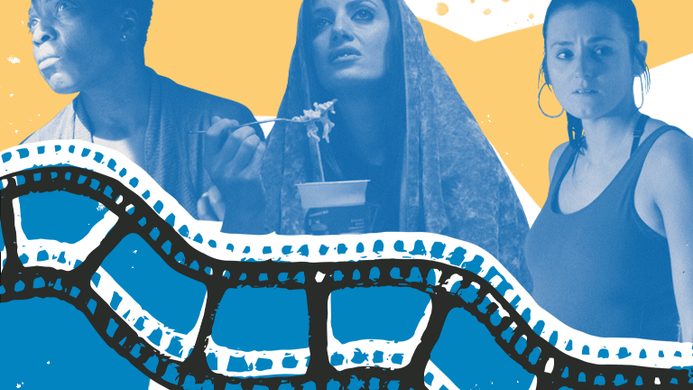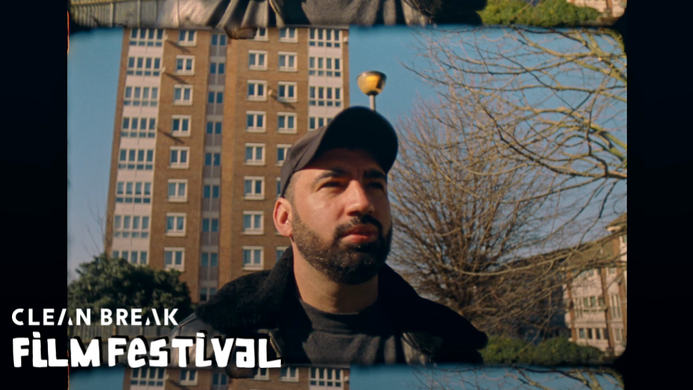
Member artist Kim Theresa (KT) Marsh shares her interpretation of the film Violet Gave Willingly
As part of Clean Break's Film Festival 2024, we invited our Members to write about the films in our programme. A group of Members generously put themselves forward for the task, and have shared honest, insightful interpretations and reviews of the films.
Read what Kim has to say about the film Violet Gave Willingly (there are spoilers in this article so we recommend watching the film first):
To understand the title I had to watch the film right to the end (“Who’s Violet, and what’s the significance of the colours flashing in sequence? Oh crumbs, it’s not about ART is it??”)
Lots of films have colours in their title, ‘Purple’ springs to mind and you can probably think of others. An emotional response to colour is the subject here.
The filmmaker (director, cinematographer – the one holding the camera) Claire Sanford interviews her mother, textile artist Deborah Dumka, at work. Her studio in a large ramshackle house by the sea, is cosy and orderly yet also seems built of packing cases and pallets (like the boat Collective Spirit from the 2012 Olympics) - reminding us that Art is recycled from Life. For the imagination to cross rivers and oceans it must also be rooted in real-world practicality.
We never see the filmmaker on screen. Claire’s camera unflinchingly, sometimes uncomfortably, focusses on her mother and her process. I wondered, could that be Claire’s face on the poster overlaying part of her mother’s? - an image wherein the younger woman is storytelling on behalf of the older woman behind. Claire reveals (part of) her own story too through this medium later on.
It is clear from the opening lines that there will be some opacity – almost clarity, but not quite - in the telling. Prompted “talk about the word ‘resistor’” Deborah replies, “Resistance is...” (transposing from the personal to the general). “Resistance is pushback, opposition” (echoing the transgression themes of Clean Break’s five Unfamous Women at Brixton House theatre earlier this summer).
A resistor controls the flow of current through a circuit. Deborah’s art has a scientific component - formerly an electrical engineer, she describes colour as electromagnetic energy. “It’s an important filter to see the world and connect to emotions.” “Can you describe your emotions?” asks Claire. “NO” they both laugh – this is familiar mother/daughter territory. “Now you have to put that down” (the camera) requests Deborah, but Claire doesn’t!
Her mother has been moved to tears by this exchange. “There really aren’t words. My emotions are my palette, I don’t like them, actually that’s not true, they’re just tied up – there really aren’t words.” It is very evident that Deborah expresses her deepest feelings through her colourful visual work, and does not TALK about feelings easily.
“There’s resistors in your camera” she tells her daughter; Deborah herself is a Resistor (of her own feelings).
Let’s start with a big one, ANGER. Anger is bad? - nope it’s completely normal and natural to experience anger (as many therapists have assured me!) “What’s your relationship to anger?” asks Claire. “Do you ever see me angry?” her mother deflects, as she concentratedly rolls red fibres back and forth, with her head down and a set mouth and jaw. “I can’t tell, can’t say I felt angry. Anger, can’t really dig it – dig INTO it”. Cut to a scarlet felt disc like an enormous badge with the slogan “BAD” in black capital letters.
Any time unseen Claire asks a specific question, Deborah answers obliquely, giving us the sense that she resents being interrogated. Claire, clearly well-used to her mother’s fuzzy open-to-interpretation, “we’ll see”-type responses, questions simply and directly. “What’s your understanding of what we’re doing here?” Haha! Hilarity! “you ask the funniest questions” hedges her mother, buying time – ”I think you are trying make me confront my past.” (confront, not explore – expect a battle, a confrontation). Her bared-teeth smile and prevarication indicate fear mixed with laughter as she confirms “it makes me feel nervous”.
What’s Deborah angry about? “why did I leave engineering?” the music is ominous. “I don’t want to blame...” (she doesn’t clarify whoever that is).
Cut to Deborah walking on a beach, wearing shades, ruminating with a half-smile conveying sadness. Waves lap at shingle as she crosses the pebbles, indicating passage of time, the grinding, the wearing-down of rocks. With her hair down and tumbling over her shoulders, we can imagine her in “yoof”; less grandmotherly Mrs. Potts and more Woman Who Runs with Wolves. “There were NO other women in the class – female engineers are an anomaly”. Deborah achieved her engineer certification but has no words for her emotions.
There’s a surprising interweaving of their stories when they discuss what is revealed to be the title of the film, an extraordinarily offensive mnemonic which is taught in engineering school.
Resistors are colour-coded to denote their value and the mnemonic is as follows. Bad Boys Raped Our Young Girls But Violet Gave Willingly. Black Brown Red Orange Yellow Green Blue Violet Grey White.
There was no reaction to this extraordinarily offensive statement in Deborah’s class. There were NO other women in her training group.
A prediction, even a permission, is implied in that statement, Bad Boys Rape. Violent crime - ‘that’s gonna happen, cos of the state of the world’.
“That's why the mnemonic infuriates me”
Deborah’s eyes fill with tears and her half-smile becomes a grimace. “How are you?” she asks her daughter, as if for the first time. The screen turns white (Willingly).
“Is it meaningful for you to tell your own story?” “I’ve never told him” she replies, then walks out of shot. She doesn’t identify the HIM but we can all supply one from our own imaginations.
In the final frames, through gallery windows we see felt figures displayed along a white corridor, girls in these ten colours, dancing, socialising, connecting. Some have lighting-up circuits illuminating brain, heart, hand. Deborah’s joyful “little women” fuse science and art, using electromagnetics to bring a non-organic dimension to her work, not limited to textile alone.
Yesterday, I asked a young (30 M) engineer, if he’d ever heard a mnemonic for resistors and he responded without hesitation, “’bad boys rape our young girls but virgins go without’- When our tutor said that there was a shocked silence, then a weak ripple of laughter.” Any women in your class? “YES!” two or three out of a hundred. “There are no barriers nowadays to women in engineering”, he stated confidently, “NONE.”
Really? Violet may have retired and “virgins going without” IS gender-neutral, but I’m not sure how much progress we’ve actually made in the past 50 years.
If women honestly faced our legitimate anger more often, acknowledging that we have a perfect right to it, stopped covering up with people-pleasing, simpering silences and half-smiles, we might have access to FULL POWER more often - without resistors.

